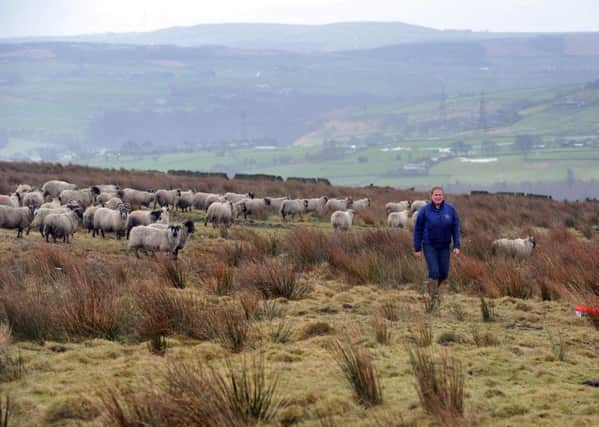Farmers advised to look at what they can control by YP panel


Many in farming have yet to react to the unfolding sense of direction on the future of agricultural policy, as set out in the Government’s recent Agriculture Bill which is due to receive its second reading in Parliament this week, the panel said.
It warned that a ‘no deal’ Brexit scenario between Britain and the EU could be “disastrous” for sectors most reliant on EU exports such as sheep farmers in the uplands.
Advertisement
Hide AdAdvertisement
Hide AdMeanwhile, those operating in the lowlands or as tenants may find that they are least well-placed to capitalise on the Government’s intention to phase out direct support payments in favour of payments for environmental work and the delivery of “public goods” after 2021.


The impact on farmers’ decisions amid the uncertainty surrounding the industry’s future was discussed by a panel brought together by The Yorkshire Post this week in conjunction with the newspaper’s 2018 Rural Awards, sponsored by Bishop Burton College.
Mulling how farmers are reacting on the farm just six months away from Brexit, Dorothy Fairburn, northern director of the Country Land and Business Association, said: “I don’t get any sense, in the industry as a whole, that people are changing anything yet. They are not really facing up to it.”
There is little farmers can change in terms of how they farm but they should look at ways of increasing their income by other means, stated fellow panellist and farmer, Charles Mills.
Advertisement
Hide AdAdvertisement
Hide AdMr Mills, the Yorkshire Agricultural Society’s show director, said: “What can you do? You can’t not go and drill wheat. We all know that 40 per cent of UK sheepmeat goes into Europe. A lot of that lamb that goes there are small hill lambs. Those farmers in the uplands have nothing else they can do, they can’t plough their land up.


“We are limited in what decisions we can make because we don’t know where we are going to be, but we do need to look at what our asset can produce rather than rushing out and paying £10,000 an acre for more land. I think to get bigger isn’t always the answer, you have got to be incredibly efficient in what you do.
“If you haven’t been running the business efficiently in the past I think you certainly have to do now.
“After 2021 we don’t get BPS payments and there is some talk that monies will be put back into the industry by environmental measures. We don’t have a clue on what that will be but I certainly don’t think it will be the amount that we receive now in BPS money – and I think uplands may well benefit more than lowland farms.
Advertisement
Hide AdAdvertisement
Hide Ad“We can only look at our own businesses and look and see where we can introduce income to replace BPS money. Although not everybody can do that, if you are in a tenanted situation it makes it very difficult for you, and I think in some cases you may have to look and see if you can get a second job.”
Dairy farmer Paul Tompkins from near York, who is vice-chairman of the national dairy board at the National Farmers’ Association, said he believed that because farmers think and work in long-term cycles, there may be a lack of consideration about more short-term disruption that is potentially on the horizon.
He said: “We rotate our crops every three years, we inseminate a cow that’s going to come into our milking herd in two years and nine months’ time, so we have a very long-term view and I’m not sure that has changed much.
“I think that long-term view has probably insulated some of farmers’ thoughts around Brexit, in that they have not thought about the short-term implications, just the longer term ones. Only when we start getting detail from the Government are they going to think about how is this going to actually affect ‘me’.”
Advertisement
Hide AdAdvertisement
Hide AdBoth Mr Tompkins and Laurie Norris, the NFU’s North Riding county adviser, said there are many farmers who continue to see Brexit as an opportunity.
Citing one particular farming couple she had visited recently, Ms Norris said: “Their view was that some people will decide to exit the industry, some people will retire, naturally, and they will be there to meet that shortfall, so you do have some people who do say there is an opportunity and ‘I’m going to go and grab it’.”
Brian Richardson, the newly appointed head of agriculture at Yorkshire and Clydesdale Banks, said he too had picked up on positive sentiments.
“I think there is confidence in the industry. The industry is just going to be different, with fewer people, and I don’t think that is just in pure farming, I think the supply industry will need to adapt too.”
A BIG CHALLENGE
Advertisement
Hide AdAdvertisement
Hide AdOur panel hailed the adaptability and positivity of many in farming, as banker, Brian Richardson, put it: “If you look at Foot and Mouth and the crisis the industry went through then, it came out the other side. Most people restocked and got on with it. There will be another iteration of change come along and those that want to be in the industry will stay in it.”
Adding a note of caution, the CLA’s Dorothy Fairburn added: “But I do think we need to use this period as a moment for people to look at their businesses properly. If they don’t properly plan then they are just going to drift on.”